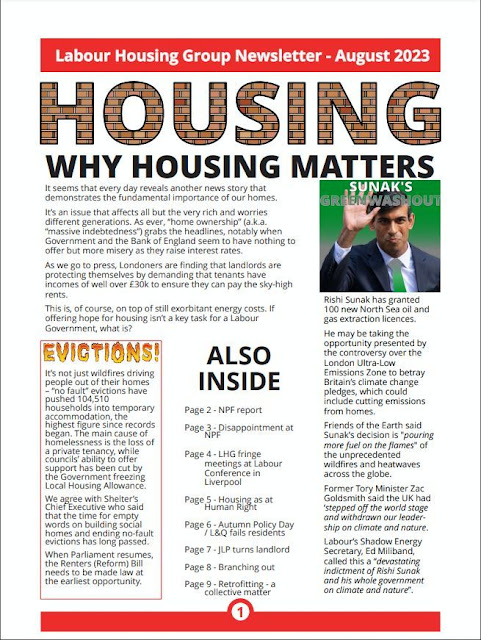I was asked to put the case for rent controls in the latest edition of the Labour Housing Group newsletter
here. See below and also in the link the case AGAINST rent controls as well.
"Here are two articles about rent controls. John Gray, former Cabinet Lead for Housing
Services in the London Borough of Newham makes the case in favour while Chris Worrall
argues against. Further contributions are welcome on what will no doubt remain a
contested subject!
Paul Martin (Editor) pauljmartin@clara.co.uk
For some time before the
General Election in December
2019, I had been exploring with
our Council Pension Committee
whether we should be investing
money in social housing.
Our pension officers took their
due diligence very seriously and
we had a seemingly endless
series of meetings and
presentations with institutional
fund managers and financial
advisors.
Nearly all the models included
some form of mixed tenure and
cross-subsidy of social housing
by market or intermediate rents
(or sale). I was pleasantly
surprised that, despite it being
Labour Party policy at the time
to have some limited rent
controls, most fund managers
did not appear to think that this
would cause any serious
problems with their
investments.
Some managers did think it
would have serious implications
and a small number had no
idea that the Party was
committed to rent controls and
were clearly exercised by any
such policy.
I imagine that meeting small,
private “buy to let” landlords
who are mortgaged to the hilt
and still losing money despite
charging sky high rents would have told me something very
different.
Certainly the historical evidence
on the impact of rents controls is
mixed. Were “fair rents” in the
past set too low and was that
the reason for the decline of the
private rental sector and its
“Rising Damp” reputation?
Or
was that a consequence of
government subsidy of social
housing and home ownership?
Ironically it was David Cameron
and a Conservative Government
that last imposed UK rent
controls, but only on social
landlords.
Rent controls are in force in
other countries, such as
America, Germany and France.
Again, there are differing views
on the positive and negative
consequences.
While there will be problems
with any introduction of
controls, doing nothing is not
an option because the private
rental sector is completely
out of control in many parts
of this country.
While surveys of young
professionals often show that
they are paying a staggering
50% of their income in rent, it is
families who suffer most from
high rents.
On top of living in insecure,
overcrowded and often poor
quality housing, in Newham,
East London, 66% of children
live in poverty after their
parents’ housing costs are taken
into account.
I hate to think what these figures
will be now due to the impact of
Covid-19.
Pension funds and other
investors expect market rents
to carry on growing in excess of
inflation.
In all likelihood,
today’s affordability crisis will
get even worse if nothing is
done.
Rent controls will only be part
of a wider housing solution
and a massive expansion of
social housing is my preferred
option.
However, this is not going
happen with a Tory
parliamentary majority of 80.
So we have until 2 May 2024 (or
sooner) to come up with
workable solutions.
Rent controls were first
introduced to tackle housing
problems caused by World War
One. Perhaps our modern day
Covid emergency will result in
their reintroduction.
Cllr John Gray. Former Cabinet
lead for Housing Services London
Borough Newham. Representing
Housing Association & Voluntary
Sector workers on UNISON NEC.




















